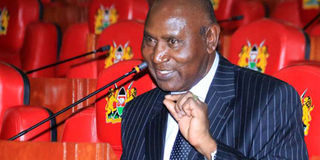What part of Kenya's economy is generating dollar revenues to repay massive debt?

Auditor-General Edward Ouko at Parliament Buildings in Nairobi on October 13, 2016. PHOTO | JEFF ANGOTE | NATION MEDIA GROUP
What you need to know:
In current audited report of national government’s financial statements, Auditor General has categorically stated he is unable to verify receipt, accounting and use of the net proceeds of Eurobond amounting to $215 million.
In layman’s terms, Auditor General has raised the red flag over entire Eurobond issue of 2014, save for $395 million, which he confirmed was transferred to Consolidated Fund.
I hope that the Auditor General, Mr Edward Ouko, will not be intimidated by the remarks made on Tuesday by President Uhuru Kenyatta about the investigation his office is conducting on the Eurobond transaction.
Speaking in a rather derisive tone, President Kenyatta seemed to imply that the Auditor General was mistaken in trying to trace the movement of the Eurobond proceeds in the accounts belonging to the Central Bank of Kenya at the Federal Reserve Bank of New York. Apparently, the auditors that Mr Ouko’s office sent to New York were not allowed access to the CBK’s accounts there.
At one stage, the speculation in the corridors of Anniversary Towers, where the Kenya National Audit Office is based, was that the Auditor General had been advised to seek the support of his counterpart in New York, the Comptroller-General, who has powers to subpoena the information he needed.
There were even rumours that Mr Ouko had recently held a meeting with his US counterpart, Mr Gene Dodaro, in Johannesburg to discuss the prospects of cooperation on a multi-agency investigation, similar to what happened in the case of the Malaysian Eurobond scandal, which was led by a team involving the Department of Justice, the Federal Bureau of Investigations, and US Treasury agencies, including the Financial Crimes Enforcement Network and the Office of Foreign Assets Control.
However, I later learned that this speculation may have been sparked by a chance meeting between Mr Dodaro and Mr Ouko that happened during an international conference of supreme audit institutions that took place in Johannesburg.
What became clear after President Kenyatta’s statement on Tuesday was that Mr Ouko is going to be a man under close watch.
SPECIAL AUDIT
It is instructive that the President’s statement came against the backdrop of an ongoing special audit on the Eurobond transaction, which the Auditor General is scheduled to table before Parliament in a matter of weeks.
Well-informed sources have told me that Mr Ouko has been under immense pressure to change his position on the disclaimer of opinion he made on the Eurobond transaction in the current audited report of the national government’s financial statements.
In that report, the Auditor General has categorically stated that he was unable to verify the receipt, accounting, and use of the net proceeds of the Eurobond amounting to $215 million.
In layman’s terms, the Auditor General has raised the red flag over the entire Eurobond issue of 2014, save for $395 million, which he confirmed was transferred to the Consolidated Fund.
Discerning readers will also remember that the Auditor General has also taken issue with the constitutionality of $604 million which was deducted from the Eurobond proceeds at source and used to repay loans that matured in August 2014, which the government had contracted from a syndicated group of banks.
Thus, the stakes in the behind-the-scenes battle between the government and the Auditor General are high indeed.
What makes the stakes even higher is the fact that transaction advisers for the new Eurobond issue have reportedly indicated that the government needs to get an unqualified audit opinion from the Auditor General before it floats a second Eurobond issue.
The fact that Treasury Cabinet Secretary Henry Rotich budgeted to raise $4 billion from Eurobond issues in the current financial year is yet another headache for the finance chief. With the second quarter of the financial year approaching, further delays in the issuance of a Eurobond is bound not only to exert immense pressures on cash flows but also cause major disruptions in the domestic borrowing programme.
NEAR FUTURE
Worse still, signs are that the external environment is not going to look too good in the near future. With the US Fed expected to hike its rates and oil prices beginning to rise, indications are that Eurobond issues are going to become more expensive and unviable for Kenya in the coming months.
Still, the big question we must confront as a country is this: Are we borrowing too much of these external loans?
If you ask the government, you will be told not to worry as we are still well within the limit of the debt sustainability thresholds set by the IMF. The truth of the matter is that IMF’s debt sustainability frameworks only serve to mask the gravity of countries’ indebtedness.
Currently, the United Nations Conference on Trade and Development’s so called principles of “responsible sovereign lending and borrowing”, which measure ability to repay expensive dollar loans, is widely considered to be more relevant to countries such as ours.
Although the year 2024 may look far away, we will be expected to make one bullet payment of a massive $2.4 billion for the Eurobond we borrowed in 2014. What part of our economy is generating the dollar revenues to repay these massive debts?





